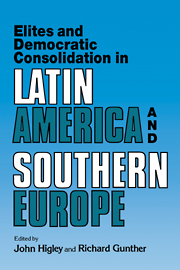Book contents
- Frontmatter
- Contents
- About the contributors
- Preface
- 1 Introduction: elite transformations and democratic regimes
- 2 Spain: the very model of the modern elite settlement
- 3 Elite settlements and democratic consolidation: Colombia, Costa Rica, and Venezuela
- 4 Mexico's elite settlement: conjuncture and consequences
- 5 Elite unification and democratic consolidation in Italy: a historical overview
- 6 The role of civil–military pacts in elite settlements and elite convergence: democratic consolidation in Uruguay
- 7 Patterns of elite negotiation and confrontation in Argentina and Chile
- 8 Elites in an unconsolidated democracy: Peru during the 1980s
- 9 Brazil's political transition
- 10 Redefining the Portuguese transition to democracy
- 11 The Dominican case
- 12 Elites and democratic consolidation in Latin America and Southern Europe: an overview
- Index
9 - Brazil's political transition
Published online by Cambridge University Press: 05 June 2012
- Frontmatter
- Contents
- About the contributors
- Preface
- 1 Introduction: elite transformations and democratic regimes
- 2 Spain: the very model of the modern elite settlement
- 3 Elite settlements and democratic consolidation: Colombia, Costa Rica, and Venezuela
- 4 Mexico's elite settlement: conjuncture and consequences
- 5 Elite unification and democratic consolidation in Italy: a historical overview
- 6 The role of civil–military pacts in elite settlements and elite convergence: democratic consolidation in Uruguay
- 7 Patterns of elite negotiation and confrontation in Argentina and Chile
- 8 Elites in an unconsolidated democracy: Peru during the 1980s
- 9 Brazil's political transition
- 10 Redefining the Portuguese transition to democracy
- 11 The Dominican case
- 12 Elites and democratic consolidation in Latin America and Southern Europe: an overview
- Index
Summary
The political transition from military to civilian government in Brazil culminated in free and hotly contested elections for the presidency in late 1989. These elections were the first direct presidential elections in twenty-nine years and followed two sets of virtually free elections for the Congress, state, and local governments, as well as the proclamation of a new and democratically formulated constitution in late 1988. In terms of the procedural definition of democracy, Brazil is clearly democratic. There is a profusion of political parties representing all sectors of opinion; elections are free and vigorously contested; adult suffrage is universal; and the rights of association and expression are in force.
If one were to use a substantive definition of democracy, however, Brazil would be found wanting, owing to extremes in the distribution of wealth and influence. But substantive definitions of democracy are of limited value in empirical analysis in any case, and it is noteworthy that the lower classes in Brazil, for the first time in history, have access to numerous means of political representation and participation, including unions, interest groups, and political parties. The constitution of 1988 extended the vote to illiterates, which is unique in the history of Brazil, and it lowered the age of suffrage to sixteen. The candidate of the Workers' party (PT), Luis Inácio da Silva, or “Lula,” himself from the lower class and running on a platform explicitly in favor of lower-class interests, received the second largest share of votes, 16 percent, among the twenty-two candidates in the November 15, 1989, elections, and he missed being elected president of Brazil in the December 17 runoff election by a mere 6 percent of the vote.
- Type
- Chapter
- Information
- Publisher: Cambridge University PressPrint publication year: 1991
- 2
- Cited by

